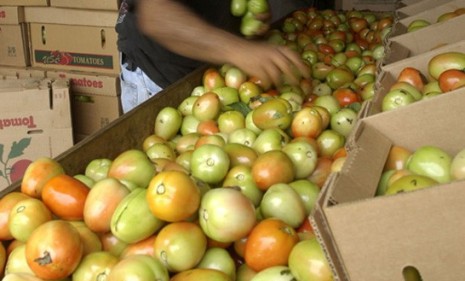Can American farms survive without illegal immigrants?
It's not just that Americans don't want to pick vegetables, says The Atlantic's Megan McArdle. We no longer know how

A free daily email with the biggest news stories of the day – and the best features from TheWeek.com
You are now subscribed
Your newsletter sign-up was successful
Georgia's tough new immigration laws may have worked too well, says Megan McArdle in The Atlantic: After no undocumented migrant workers showed up for the harvest, Georgia farmers left millions of dollars worth of fruits and vegetables rotting in the fields. Some economists have even pointed out that if the farmers had to hire legal pickers, they'd go bankrupt. But almost everyone is "wildly underestimating what's involved in becoming a skilled picker," McArdle says. If the U.S. actually seals off our southern border, "we will see a lot more ruined crops." Here's an excerpt:
Most fruits and vegetables require surprisingly skilled handling (which is why they still use pickers, instead of machines). Bad picking can easily destroy the profit margin on your crop, costing you more than you gain....
The illegal immigrants who harvest our crops have grown up doing this, learning the way my grandparents did. There are almost no Americans left who have either the painfully developed musculature or the painstakingly acquired knowledge to rapidly harvest a field without damaging the crop. And acquiring those skills is tricky, because the picking season for any one crop is very short... after which, it's time to start picking another crop that you don't know how to handle. And it's best done in a group of people who know what they're doing, not in a clueless mob that just got dumped in the fields for the first time.
The Week
Escape your echo chamber. Get the facts behind the news, plus analysis from multiple perspectives.

Sign up for The Week's Free Newsletters
From our morning news briefing to a weekly Good News Newsletter, get the best of The Week delivered directly to your inbox.
From our morning news briefing to a weekly Good News Newsletter, get the best of The Week delivered directly to your inbox.
Read the entire article in The Atlantic.
A free daily email with the biggest news stories of the day – and the best features from TheWeek.com
-
 The environmental cost of GLP-1s
The environmental cost of GLP-1sThe explainer Producing the drugs is a dirty process
-
 Nuuk becomes ground zero for Greenland’s diplomatic straits
Nuuk becomes ground zero for Greenland’s diplomatic straitsIN THE SPOTLIGHT A flurry of new consular activity in the remote Danish protectorate shows how important Greenland has become to Europeans’ anxiety about American imperialism
-
 ‘This is something that happens all too often’
‘This is something that happens all too often’Instant Opinion Opinion, comment and editorials of the day
-
 The billionaires’ wealth tax: a catastrophe for California?
The billionaires’ wealth tax: a catastrophe for California?Talking Point Peter Thiel and Larry Page preparing to change state residency
-
 Bari Weiss’ ‘60 Minutes’ scandal is about more than one report
Bari Weiss’ ‘60 Minutes’ scandal is about more than one reportIN THE SPOTLIGHT By blocking an approved segment on a controversial prison holding US deportees in El Salvador, the editor-in-chief of CBS News has become the main story
-
 Has Zohran Mamdani shown the Democrats how to win again?
Has Zohran Mamdani shown the Democrats how to win again?Today’s Big Question New York City mayoral election touted as victory for left-wing populists but moderate centrist wins elsewhere present more complex path for Democratic Party
-
 Millions turn out for anti-Trump ‘No Kings’ rallies
Millions turn out for anti-Trump ‘No Kings’ ralliesSpeed Read An estimated 7 million people participated, 2 million more than at the first ‘No Kings’ protest in June
-
 Ghislaine Maxwell: angling for a Trump pardon
Ghislaine Maxwell: angling for a Trump pardonTalking Point Convicted sex trafficker's testimony could shed new light on president's links to Jeffrey Epstein
-
 The last words and final moments of 40 presidents
The last words and final moments of 40 presidentsThe Explainer Some are eloquent quotes worthy of the holders of the highest office in the nation, and others... aren't
-
 The JFK files: the truth at last?
The JFK files: the truth at last?In The Spotlight More than 64,000 previously classified documents relating the 1963 assassination of John F. Kennedy have been released by the Trump administration
-
 'Seriously, not literally': how should the world take Donald Trump?
'Seriously, not literally': how should the world take Donald Trump?Today's big question White House rhetoric and reality look likely to become increasingly blurred